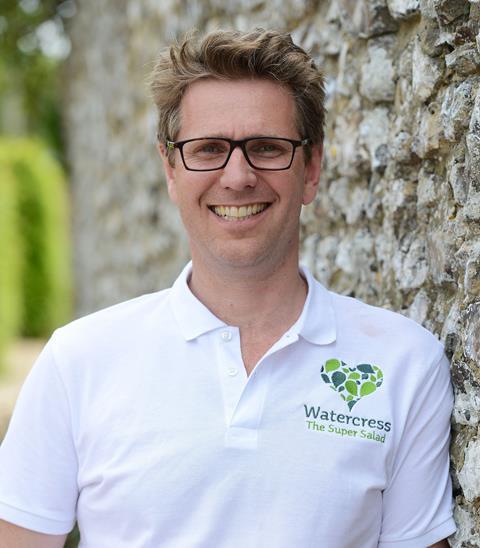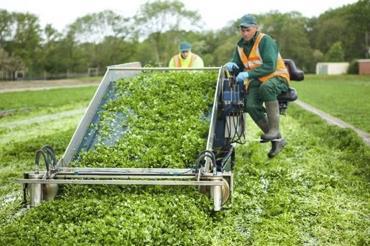Tom Amery, MD of The Watercress Company, describes the grower’s journey to pesticide free and the benefits and challenges it brings

Twenty-five years ago, The Watercress Company (TWC) stopped using pesticides across all its UK farms. It was a bold decision and in 2000 went against general farming consensus.
Today TWC is proud to declare itself pesticide free, offering a genuine glimpse into farming as it was before the post-war agricultural revolution that encouraged the use of high levels of insecticide and fertilisers that actively work against nature.
It wasn’t a decision without risk as no one was entirely sure how nature would react or how the uncontrolled re-inhabitation of insects in the watercress beds would affect the crops, whether there would be crop losses, pest outbreaks and scepticism from other growers.
However, today, the natural balance has been reinstated, and nature is working for the benefit of the watercress, the rivers into which the water from the beds flow, the birds, bats, other insects and of course consumers.
Biodiversity flourishing
Working with Robert Aquilina, an independent freshwater ecologist, TWC has monitored insect life in the beds and specifically the quality of the water and environment at the outflows of the beds. The latest report, published in September 2025, confirms for the seventh consecutive year that the species present were typical of a chalk stream, with good macroinvertebrate diversity and high water quality scores.
In fact, this year, a new species of flat-bodied mayfly (Heptagenia sulphurea) and a new species of caseless caddis (Hydropsyche pellucidula) were recorded on two of the farms where they had not been seen before.
It is estimated that 1.7 billion insects now thrive on the 16 hectares of watercress beds owned by TWC in the UK. They live in harmony, 99 per cent of them living in the watercress and each species having its own particular function as most of the macroinvertebrates don’t eat the watercress itself.
When Robert Aquilina examined a cross section of the watercress bed, from watercress growing on top, down to the gravel and sand at the bottom, he likened it to the Amazonian jungle. The watercress leaves were alive with insects, such as spiders and mayflies, living on and under the ‘canopy’, and feeding off other insects. Different species fed on debris in the gravel and sand, releasing nutrients and reducing the need for fertiliser, and the millions of non-biting midges that act as food for the growing numbers of birds and bats that live around the watercress beds provided a consistent, reliable food source.
Technological progress
To protect insect life and ensure as few as possible end up on a consumer’s plate, TWC has developed its own harvester with shaker belts that gently agitate the crop when it’s been cut, removing the majority of insects by ‘bouncing’ them off and returning them to the watercress beds.
The quest for residue-free necessitated other changes too. TWC has had to source specialist packers who have advanced wash systems to rinse the crop and ensure any remaining insects are removed before the watercress is packed into the 500,000 bags sold every week in the UK.
The packers have had to accept that the occasional imperfection, such as a small hole in the leaf, is a sign of truly chemical-free farming and not a cause for rejection. But, for the most part, the pesticide-free practices allow TWC to produce perfect-quality product that works with nature, not against it. In fact, for 25 years, they have produced and sold over 25 million kg of residue-free watercress.

Communicating to consumers
In the UK there is no official audit or symbol that can be used on packaging to show that the crop is residue free. The nearest to it would be organic, but there are additional criteria that are very difficult for farmers to meet and the added consumer preconception that organic is, to many, offputtingly expensive is another consideration. TWC feels ‘residue free’ is a simpler message to convey and hopes, in part, to have found a solution.
TWC own and manage watercress farms in Spain to sustain UK sales in the winter when UK production is much lower. In Spain there is an auditing scheme called Zerya which is recognised across Europe and certifies if producers are residue free or not. TWC’s Spanish farms have been pesticide free for five years and are being assessed by Zerya. When this is audit is successfully completed, TWC will be the first UK operator to be certified residue free.
However, until UK supermarkets allow such a recognition on UK packs, few consumers will be aware of TWC’s achievement. UK retailers are not quite ready for another symbol on pack; they fear consumer confusion and that it would be to the detriment of other products that are not residue free.
I was technical director in 2000 and convinced the rest of the board to stop using pesticides. We wanted to be the best in the industry both then, and now. We had a vision to be pesticide free so in 2000 took the bold decision to remove all sprays from our UK operation. Over 25 years we have been colonised by 1.7 billion insects, but we don’t see them as pests; instead we have harnessed them to help production.
I really feel that we have taken watercress farming back to nature and how it should be done. It was the way our forefathers farmed before the agricultural revolution of 1945 when industrial farming, pesticides and fertilisers were introduced to maximise production.
I strongly believe that our way of farming is not only environmentally good, but morally and ethically good too. It’s not without commercial risk – this summer we had to bypass 50 tonnes of watercress because of a sawfly infestation but as a one in 10-year event it’s testament to our resolve to stick to pesticide free. We strongly feel that our story would appeal to the growing numbers of consumers who really care about pesticide use but until we can show it on our packs, they just can’t be told about our achievements.



